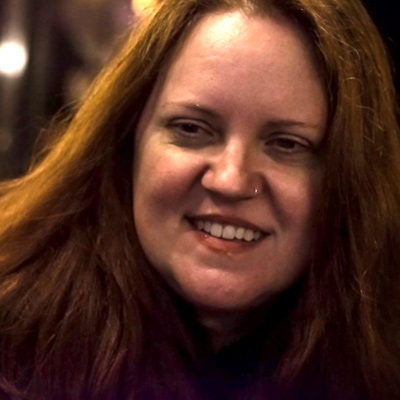Sarah Fulmer is used to telling her story. From writing in journals to speaking on stage, she’s spent a lot of time sharing her deepest thoughts and tales of her life. “I knew even when I was very, very, very small, before I had the language to express it, that I was here to tell the truth,” Sarah says.
Like many people, Sarah’s led a very active life. In addition to being a mom, “I was the board president of this arts organization, and I was running a storytelling program, and I was helping people. I was making candles for a living, and I was helping people organize their houses,” she says. But one thing she wasn’t getting around to was writing her memoir. “I was always very busy, and I didn't make any space for writing my truth. But I thought, well, someday I'll have time.”
She didn’t realize that, once she found the time, vision loss might get in her way.
Sarah currently lives in Columbus, Ohio. But her Michigan childhood involved many moves in the Detroit area—along with quite a bit of trauma, a lasting impact of which is PTSD. And her eyesight didn’t make things easier. “I had never had good vision,” Sarah says. “I was seven years old before I got my very first pair of glasses and suddenly everything was much crisper.” In 2013, Sarah was in her 40s when she started to notice extreme light sensitivity and headaches. Many doctor visits later, she was ultimately diagnosed with chronic idiopathic uveitis. “Which is basically, ‘We have no idea,’” Sarah explains.
For several years, Sarah continued to slowly lose vision, which made life increasingly difficult. “It felt like a Band-Aid being ripped off one hair at a time,” she remembers. In early 2020, she had lost most of her vision, and during the COVID pandemic lockdown, she completely lost her sight.
Adjusting to this reality has meant adjusting anew to relationships. “It places me in a completely different relationship with all my friends,” Sarah explains. But most importantly, she’s needed to reimagine her relationship to herself. “As a person who had always taken care of myself, to be in a position where there's so many more challenges to that … it’s quite a bit to navigate,” she relates.
When Sarah started losing vision, she didn’t know where to turn for help. Technology, something that came naturally to her before, suddenly was challenging. “I just wanted to scream. I can't tell you how many times I wanted to throw my phone,” she says. “I'm just trying to be patient with myself, but there's a part of me that feels frustrated. I was extraordinarily competent my whole life. “
At one point she searched online "What do blind people do for a living?" Google came back with: "Blind people can do anything they want for a living."
“Yeah, but how?” Sarah wondered. “Who’s talking about the how? I couldn’t find that,” she recalls.
Then, she came across Hadley. “Now, for the first time—as a person who can't see but is utterly proficient in most ways—I have access to something that gives me the information that I need in real time, and it's broken down in a way that I can figure out.”
Sarah has taken several tech and daily living workshops with Hadley, and she’s in the process of learning braille, too. “The reason that I want to learn braille is that I love reading out loud. I always have. I read The Lord of the Rings out loud to my children, all of them.” In the past, she says, “I read everything out loud all the time. I read my own work out loud. Now I can't, I don't know how to do that.”
Sarah is also part of Hadley’s pilot program of peer-to-peer mentors. “It was really nice to talk to somebody else who has lost her vision,” she says. “I have a lot of questions about how to manage. It’s very empowering to hear her say, ‘Yeah, it was really stressful for me, too. It was complex and difficult. But now I'm 20 years on the other side of it and I'm just adjusted to my life.’”
Now, Sarah is taking the time—and using new skills—to write her memoir. As someone facing both PTSD and blindness, she realizes the unique perspective she brings to the world. “I'm not going to allow the fact that I can't see rob me of my mission,” Sarah says. “It feels like my goal, my point, is to show up as my authentic self and speak my truth. I have my own ability. Something I bring to the table that other people don’t have.”
She is also pondering creating a new podcast. “I would love to do a podcast where I ask several different people, including children, to explain to me what they see, what does something look like? They don't know about each other's answers, so you can hear side-by-side what those differences are, how what you see and what you perceive is completely specific to you.” As Sara puts it, “There a lot of people who can see, but they don't know how to look.”
Looking back, Sarah wishes her ophthalmologists had given her information about living with vision loss. Instead, she felt like when the medical treatments weren’t successful, the doctors simply gave up on her. “There were no next steps. Instead, I was wandering off into a void with a medical problem no one can solve and feeling alone with that.”
She wishes someone had handed her a brochure with advice: "Here's a place that you can find online while you still have some vision. Go take some workshops, go start learning braille, go join some chat groups.” She did find her way to Hadley. But it didn’t need to be such a long and winding road to get here.
